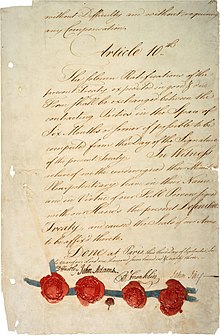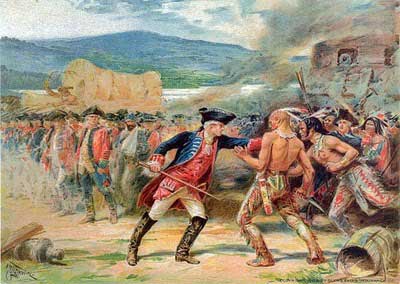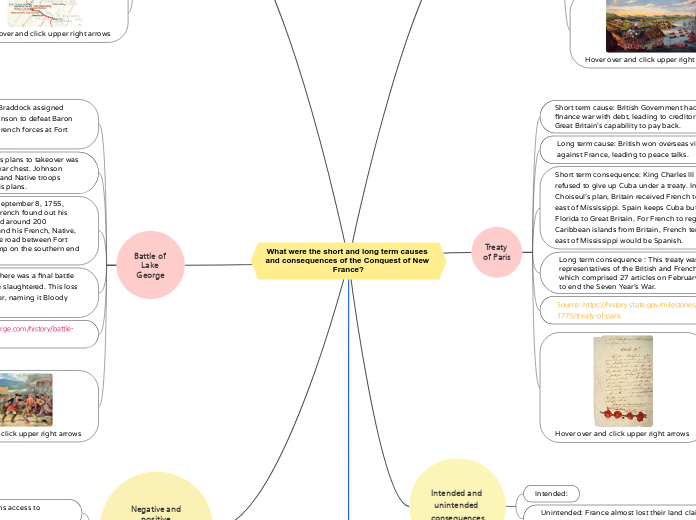What were the short and long term causes and consequences of the Conquest of New France?
Plains of Abraham
Short term cause: France and Great Britain were at war to see who will take over the European trade.
Long term cause: The rivalry took place on the ground in North America, creating an official conflict between the two countries in 1756.
Short-term consequence: Many homes were destroyed in Québec City, and needed to be re-built.
Long-term consequence: Québec City over time developed a British parliamentary system and its lumber production grew in the 19th century, buoyed by the winds of the British trade.

Hover over and click upper right arrows
Add your text
Treaty of Paris
Short term cause: British Government had to finance war with debt, leading to creditor doubt Great Britain's capability to pay back.
Long term cause: British won overseas victories against France, leading to peace talks.
Short term consequence: King Charles III of Spain refused to give up Cuba under a treaty. In Choiseul's plan, Britain received French territories east of Mississippi. Spain keeps Cuba but gives Florida to Great Britain. For French to regain Caribbean islands from Britain, French territory east of Mississippi would be Spanish.
Long term consequence : This treaty was signed by representatives of the British and French Crowns which comprised 27 articles on February 10, 1763 to end the Seven Year's War.

Hover over and click upper right arrows
Intended and unintended consequences
Intended:undefined
Unintended: France almost lost their land claims in North America and their trading interests in India.undefined
Ohio River Valley
Short term cause: In 1754 the British sent George Washington to build Port Pittsburgh
Long term cause: Both the French and British claimed Ohio RIver for the fresh water, fish, beaver fur, and a place to build a harbour.
Short term consequence: The seven years war began in 1754 but the British declared war on the French in 1756.
Long term consequence: Great Britain got a lot of territory in North America during the war, but colonial discontent and argues over war expenses led to the American Revolution.

Hover over and click upper right arrows
Battle of Lake George
Short term cause: General Braddock assigned Mohawk chief, William Johnson to defeat Baron Ludwig August Dieskau's French forces at Fort Saint-Frédéric.
Long term cause: Braddock's plans to takeover was found by the French in his war chest. Johnson controlled British, Colonial, and Native troops unaware the French knew his plans.
Short term consequence: September 8, 1755, around a month after the French found out his plans, Johnson's troops and around 200 Moawhawks met Dieskau and his French, Native, and Canadian forces on the road between Fort Edward and the British Camp on the southern end of Lake George.
Long term consequence: There was a final battle and the French forces were slaughtered. This loss filled a nearby body of water, naming it Bloody Pond.

Hover over and click upper right arrows undefined
Negative and positive consequences faced by the First Nations
The British restricted First Nations access to European goods.
Chief Pontiac led an armed riot to stop British expansion.
What the First Nations thought of this
During the Battle of Lake George, the First Nations didn't want to participate in another battle that would make them go against their own kind.
